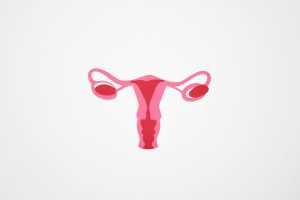 All I Want for Christmas is … a Hysterectomy
All I Want for Christmas is … a Hysterectomy
This Christmas, I’ve asked for something I’ve avoided for years. It isn’t something that can
be boxed and placed under a tree, but nonetheless I find myself counting down the days in eager anticipation.
All I want for Christmas this year is a hysterectomy. My procedure is scheduled for December 26th.
The truth is, my uterus and I have always had a rocky relationship. My menstrual cycles have always been very challenging. The way my cycles started — back in 1991 just before I turned 11, was a clear sign that I was in for 32 years of grief. I was at Girl Scout camp, reeling from the intensity of what I thought was stomach cramps from dining hall food, when I discovered I was bleeding… while in one of the camp’s outhouses. What followed was a full week of trying to hide my newly established “womanhood” from the other campers my age.
I continued to hide my cycles from my friends until most of them started theirs, a few years later.
When I was 17, my mother took me to the gynecologist to get on the pill — the primary reason being PMS, cramps, and mood swings associated with my cycle (birth control was the secondary reason, of course). Throughout my 20s, the pill helped regulate things, but strong, vice grip-like cramps every 28 days were always part of my norm.
 My uterus and I got along best when I was pregnant — first at age 28, later at 32. I enjoyed pregnancies largely because I was free from the monthly torture — even chronic Braxton-Hicks, bulging varicose veins, and a blood clot scare couldn’t compete with the pain and discomfort of my menstrual cycles (though labor sure did!).
My uterus and I got along best when I was pregnant — first at age 28, later at 32. I enjoyed pregnancies largely because I was free from the monthly torture — even chronic Braxton-Hicks, bulging varicose veins, and a blood clot scare couldn’t compete with the pain and discomfort of my menstrual cycles (though labor sure did!).
After my second and last pregnancy and multiple varicose vein procedures, going back on the pill wasn’t an option (due to the increased blood clotting risk). My gynecologist friend recommended an IUD. I was 35, and despite all of the horror stories you can find online, I found IUD insertion a mildly uncomfortable, quick process. What followed was 5 years of regular cycles with mostly manageable cramps and bleeding. I was never lucky enough to completely “lose” my period, as many women with IUDs often do, but menstruation finally felt a little normal — and there was the added bonus of built-in contraception.
In 2020, when I was 40, I had a new IUD inserted, and things slowly began to change … for  the worst. My monthly cycles grew increasingly heavy, and the gripping cramps returned, especially on day 2. As I aged deeper into my 40s, day 2 became something I increasingly dreaded. This day usually had me taking the maximum dosages of naproxen or ibuprofen on repeat, curled up in fetal position, while fighting nausea. Sometimes a ripping feeling across my pelvis would jar me awake in the middle of the night like a possessed alarm, and I knew: day 2.
the worst. My monthly cycles grew increasingly heavy, and the gripping cramps returned, especially on day 2. As I aged deeper into my 40s, day 2 became something I increasingly dreaded. This day usually had me taking the maximum dosages of naproxen or ibuprofen on repeat, curled up in fetal position, while fighting nausea. Sometimes a ripping feeling across my pelvis would jar me awake in the middle of the night like a possessed alarm, and I knew: day 2.
I endured this over and over until May of this year. Consistent pressure and pain had rocked in my lower pelvic region and back for weeks — not just on day 2, not just while menstruating. Every. Single. Day. I was bloated and too crampy to even run (something I love to do). My OB ordered a vaginal ultrasound which revealed some surprises:
My IUD has slipped into the lower part of my uterus. Ouch. Two previously unknown fibroids were small, but visible. Darn. My uterus was also “flipped.” What?!
I had no idea a uterus could “flip” until the ultrasound tech filled me in (the official word is “retroverted”). Apparently 20% of women also have a womb that misbehaves in this way. I would later learn this is likely what made my IUD slip and what made my cramps so bad. Had my uterus always been this way? No way to tell — but it likely could’ve happened after my last pregnancy — 10 years before.
So I had the IUD removed, and thus began six months of upheaval. My cycles without the hormones from an IUD or birth control pill were predictably horrible. I was bleeding more, cramping more, and it all lasted longer. My moods were up and down all the time. Something had to give.
 I started dreaming about a hysterectomy as a way to end my suffering once and for all. What was the sense of all this torture, if I was done having kids, and this dang uterus was dictating my quality of life like a fascist ruler? Still, I had misgivings. Removing an organ is major surgery – the kind I had never had. The recovery would be similar to a c-section (something I had worked hard to avoid). Also, as much as I was reluctant to admit it, I was psychologically attached to this uniquely feminine innard. After all, she was the organ where my babies’ lives started. My uterus was what made their lives possible (even though it was actively ruining mine). Was there something else I could try first?
I started dreaming about a hysterectomy as a way to end my suffering once and for all. What was the sense of all this torture, if I was done having kids, and this dang uterus was dictating my quality of life like a fascist ruler? Still, I had misgivings. Removing an organ is major surgery – the kind I had never had. The recovery would be similar to a c-section (something I had worked hard to avoid). Also, as much as I was reluctant to admit it, I was psychologically attached to this uniquely feminine innard. After all, she was the organ where my babies’ lives started. My uterus was what made their lives possible (even though it was actively ruining mine). Was there something else I could try first?
Enter the endometrial ablation. An “endo ablation” is far less invasive than a hysterectomy. It’s a procedure where the uterine lining (endometrium) is burned (while the patient is blissfully under general anesthesia). It can be done laparoscopically (what I opted for), or vaginally. For 80% of women, it completely takes away or lessens their periods and blood flow. Because endo ablations damage the uterus, it’s best to have a 100% birth control plan in place (such as vasectomy for your partner, or fallopian tube removal for the patient).
For roughly 20% of women, the endo ablation does nothing, or in some cases, makes things worse. Monthly blood can get trapped in the body, complicating things in a way that sometimes requires a hysterectomy.
I opted for an endo ablation in mid-July. The procedure was quick, the recovery was short (two weeks), and with little lingering bloating and pelvic pressure. For a short time, I had no period at all — and I was very suspicious, but elated! Had this actually worked?!
Soon I would find out I was part of the failed 20%.
In early November, I hastily moved large furniture around at work, and strained my lower back. Or so I thought. I took ibuprofen, used a heating pad, stretched, and stopped running again. Then I started having digestive problems: constipation and gas.
I went to urgent care, describing my symptoms, expecting an x-ray on my back. The doctor had me do some leg raises to test for sciatica, and ruled out a bladder infection through urine testing. He said I most likely had some kind of intestinal virus that just needed to run its course. He signed me up for an abdominal ultrasound (which I never did).
As I was driving home, it occurred to me that this pain was similar to what I felt when my IUD was sitting low in my uterus, back in May. Lower pelvis and back pain, discomfort while using the bathroom. I scheduled an appointment with my OB/Gyn.
At the appointment, my OB said it was very possible the pain and discomfort could be from my … uterus. The one I had just ablated, 4 months earlier. She ordered a vaginal ultrasound. My uterus was still flipped. The fibroids were a little larger. And my supposedly obliterated endometrium? It was now thicker than it had been back in May, BEFORE the ablation.
Apparently this meant blood was getting trapped, scar tissue was forming or formed, and my uterus earned a solid F where all things endometrial ablation were concerned.
I told her to please pencil me in for the next possible hysterectomy surgery. The soonest possible date was the day after Christmas … at 6:30am.
Over the next few weeks, I considered the finality of finally becoming wombless. Would this make me less of a woman? Wasn’t this like getting spayed, just like my female dogs and cats?
Was this really necessary? Maybe if I waited a few more months, my cycle would regulate itself. Maybe it was still adjusting after the ablation.
As if responding to my questions, my uterus brought me more all-encompassing pain than
I had never before experienced during that month’s period. I was now bleeding (again), and the cramps were now wrapped around my lower back and front pelvic region. Shooting pain radiated along my lower spine. Digestive issues came back — this time, diarrhea, with gas that was nothing short of lethal. (My OB confirmed that my inflamed, flipped uterus was likely pushing on my bowels.)

Once the bleeding subsided, the bloating and cramps did not. Some days it felt like early early labor pains. Making it through work was hard. I completely stopped running, and ended most days lying on top of a heating pad.
I called my doctor and told her to schedule me for good. This uterus had to go. It was time to really breakup. I teared up as I made the call, trying to focus on the waves of cramps surging through my pelvis, cramps that even 800mg of ibuprofen every 6 hours couldn’t eliminate.
A few things have been tremendously helpful through this mentally and physically challenging time. For one, therapy. My counselors and psychiatrist have been a key part of my support team. I’ve adjusted my anxiety and antidepressants, and explored some non-medicated coping mechanisms, like journaling and trying out saffron gummies. My husband, friends, and family have also been crucial members of this team. My younger brothers have been surprisingly unsqueamish and very supportive. My husband will be taking on all the household duties, kid-entertaining duties, and will be driving me to and from the hospital at the crack of dawn … the day after Christmas. He does it without a single complaint. He still hugs me and tells me I’m beautiful, even though I’m bloated and often have to run to the bathroom.
Surprisingly, strangers have been supportive too. I have found solace in the support of women I’ve never met on subreddits, and through a site called “Hyster Sisters.” This is one of the more positive experiences I’ve had on social media. One woman shared hilarious hysterectomy memes she made. Another shared a list of what she recommended post-operation: body pillows, gas-X, postpartum undies, and lots of books.
 While I’m VERY nervous about the procedure (this has been a true challenge for my already chronically heightened anxiety), I’m also hopeful. Many women I know “on the other side” say having a hysterectomy is one of the best decisions they’ve ever made — even women who never got to have kids. I know my OB has my best interests in mind, I know my family and friends are here to support me as I recover as a whiny blob on the couch, and I know this uterus is ultimately just an organ, just a tiny part of me. Without it, I’ll still be a woman — a woman with much less pain and stress dominating her life.
While I’m VERY nervous about the procedure (this has been a true challenge for my already chronically heightened anxiety), I’m also hopeful. Many women I know “on the other side” say having a hysterectomy is one of the best decisions they’ve ever made — even women who never got to have kids. I know my OB has my best interests in mind, I know my family and friends are here to support me as I recover as a whiny blob on the couch, and I know this uterus is ultimately just an organ, just a tiny part of me. Without it, I’ll still be a woman — a woman with much less pain and stress dominating her life.
And even though I’m VERY resentful of this organ that has tortured me for all 32 years of my menstrual life, I’m also grateful.
Uterus, thank you for bringing me two beautiful, healthy children, and the irreplaceable gift of motherhood. Thank you for bringing through womanhood. I definitely wish it had been a smoother, less bumpy ride, but I am thankful for the perspective these struggles have given me. I am also thankful to have the privilege of having this procedure, which will be (almost) fully covered by my insurance. A hysterectomy is an expensive procedure, an unfathomable option for too many women.
If you’re suffering through your menstrual cycles, I encourage you to speak up and be proactive. Talk to your OB/Gyn and explore your options — there are often more than you realize. Reach out to friends and family for support. As hard as it is, try to ignore the stigma about periods, sex, and women’s reproductive care — this is human health care. Most of all, take care of yourself and do what’s necessary to live your best life as the queen you are.
















